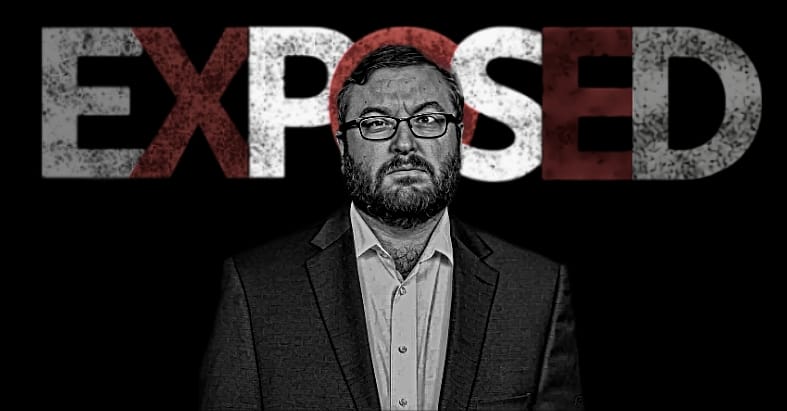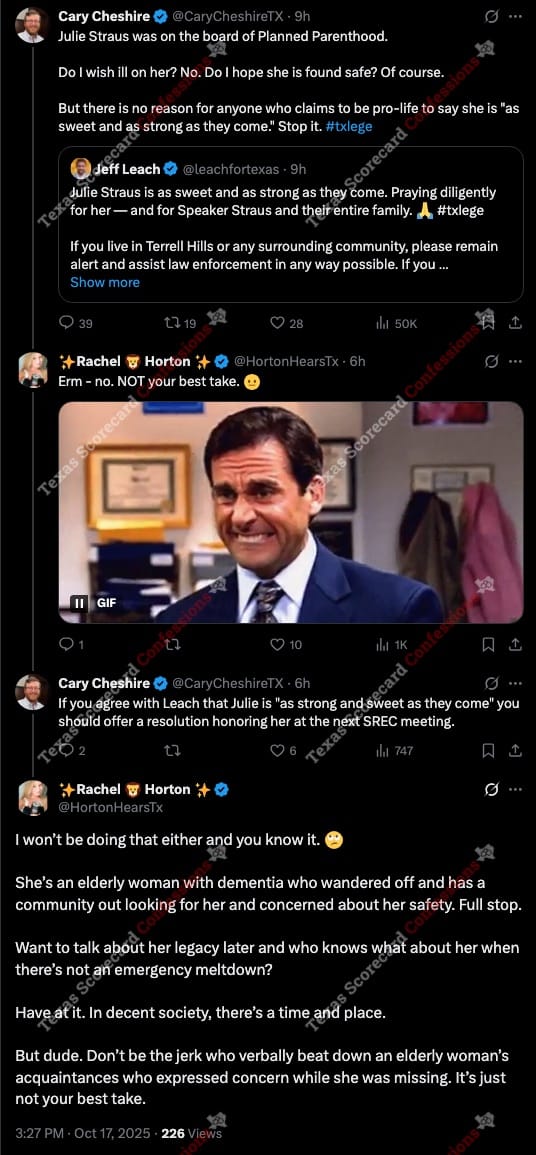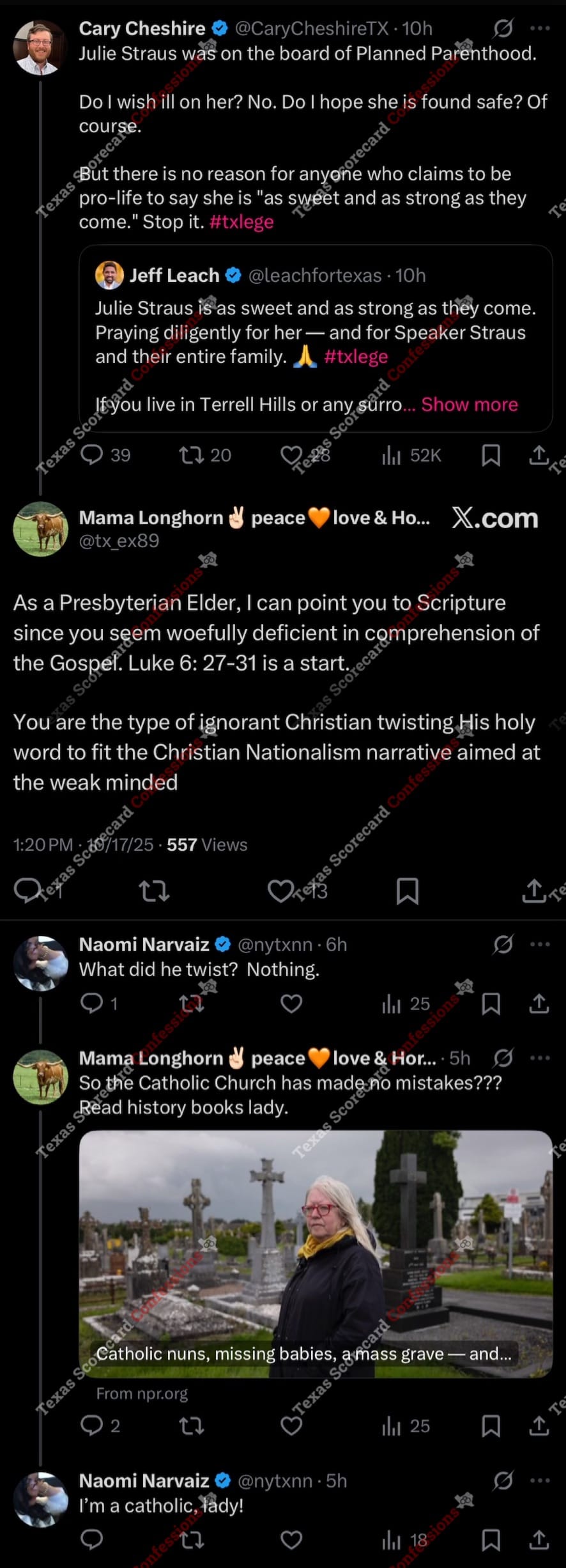How The Enterprise Rewards Indecency: The Case of Cary Cheshire
How attacking a missing dementia patient reveals the moral rot of The Enterprise

Most conservatives have found themselves defending their ideology against charges that it's cruel, heartless, and devoid of basic human decency. Conservative columnists across decades have argued that conservative principles, properly understood, are rooted in a realistic but fundamentally optimistic view of human nature, respect for institutions that bind communities together, and healthy skepticism of utopian schemes.
Yet the behavior of those within The Enterprise, who wear conservatism as a costume rather than a creed, continues to prove the critics right.
On October 17, a 64-year-old woman suffering from dementia, wandered away from her home in Terrell Hills, Texas. For about 24 hours, her family was frantic. Texas Rangers, local police, and dozens of community volunteers searched through the night. It was the kind of story that reminds you that underneath our political divisions, we're all just frightened mammals hoping our loved ones come home safe.
The woman was found safe the next afternoon, thank God. But something happened during those 24 hours that deserves our attention, because it reveals a pathology on the right that's metastasizing.
The Moment Compassion Became a Crime
When Texas State Representative Jeff Leach, a conservative Republican, mind you, posted asking for prayers and describing the woman, Julie Straus, as "as sweet and as strong as they come," a political operative within The Enterprise named Cary Cheshire couldn't resist the opportunity to... well, to be an asshole. There's really no other word for it.
Julie Straus was on the board of Planned Parenthood.
— Cary Cheshire (@CaryCheshireTX) October 17, 2025
Do I wish ill on her? No. Do I hope she is found safe? Of course.
But there is no reason for anyone who claims to be pro-life to say she is "as sweet and as strong as they come." Stop it. #txlege https://t.co/iT7qROZJyS
Cheshire, who works as a senior advisor at something known as:
Pale Horse Strategies (you know, the one that kills a quarter of the earth and turns it into Hell according to the Book of Revelation? Yeah, that one. No wait, they changed their name to)West Forth Worth Management (rechristened after what internal memos described as “a regrettable proximity to ethnonationalist energies.” The name lasted as long as their shame.)
Patriot Service Alliance responded:
"Julie Straus was on the board of Planned Parenthood. Do I wish ill on her? No. Do I hope she is found safe? Of course. But there is no reason for anyone who claims to be pro-life to say she is 'as sweet and as strong as they come.' Stop it."
Translation: "I'm performing ideological gatekeeping during a medical emergency involving an elderly woman with dementia to signal tribal loyalty and police the boundaries of acceptable compassion."
Even Rachel Horton, herself part of The Enterprise, recognized that Cheshire had face-planted into the uncanny valley of basic human decency. She pointed out the obvious: Julie Straus is "an elderly woman with dementia who wandered off and has a community out looking for her and concerned about her safety. Full stop."

The fact that this needed to be said at all tells you everything.
Usual Hate-Fueled Apologist for The Enterprise Emerges
Almost immediately, Naomi Narvaiz, universally admired in Republican Party of Texas circles as a fatuous nescient, and as a former SREC member who served as one of Matt Rinaldi’s enforcers to “intimidate fellow committee members and obstruct the release of statements” condemning Enterprise misconduct, rushed to the replies.
Narvaiz's defense? "What did he twist? Nothing."

This is the same person who worked to block SREC condemnation of Bryan Slaton after he sexually assaulted a teenager, and who intimidated SREC members trying to condemn the Nick Fuentes meeting. When The Enterprise needs someone to normalize the indefensible, people like Narvaiz are there to provide cover.
But the real story here isn't about Narvaiz; it's about what Cary Cheshire's behavior reveals about The Enterprise itself.
The Pattern: Cheshire's Career of Cruelty
For those who've followed The Enterprise network, Cheshire's behavior is not surprising. It's standard operating procedure, documented over years of increasingly brazen misconduct.
In 2020, Cheshire and an attorney named Tony McDonald were caught on audio mocking Governor Greg Abbott, a Republican governor, for being paralyzed and using a wheelchair. They joked about his disability and called him "a revolting piece of shit." Why? Because Abbott's COVID policies weren't sufficiently to their liking.
In 2023, Cheshire was involved in meetings to strategize how to protect State Representative Bryan Slaton after Slaton got a 19-year-old intern drunk and had sex with her. Cheshire's own brother worked on Slaton's staff and refused to cooperate with the House investigation. Slaton was ultimately expelled unanimously, something that almost never happens in state legislatures.
Also in 2023, Cheshire was allegedly present for a seven-hour meeting with his boss, former State Representative Jonathan Stickland, and Nick Fuentes, an actual white supremacist who has praised Hitler. When this became public, there was some organizational reshuffling, but the same people remained in the same roles doing the same things.
Notice a pattern? This isn't about policy differences. This is about The Enterprise completely untethering itself from basic norms of decent behavior, and facing no consequences for it.
After each scandal, Cheshire remained employed. After mocking a paralyzed governor, he kept his job. After being present at the Fuentes meeting, he kept his job. After involvement in the Slaton cover-up, he kept his job.
And now, after attacking people for showing compassion to a missing elderly woman with dementia, he'll keep his job.
Because that's how The Enterprise works.
The Real Target: The Straus Family Vendetta
To understand why Cheshire attacked expressions of concern for Julie Straus, you need to understand the context: her husband is Joe Straus, who served as Speaker of the Texas House from 2009 to 2019.
Joe Straus was, brace yourself, a pragmatic Republican who believed in working across the aisle, passing budgets that could actually get signed into law, and not pursuing every culture war battle to its most extreme conclusion. He was a governing conservative rather than a performative one.
For The Enterprise, this was unforgivable apostasy. They spent millions trying to defeat him and his allies. They built an entire infrastructure dedicated to purging the Texas House of anyone willing to work with Straus.
But it goes deeper. Tim Dunn, one of the billionaires funding The Enterprise, has a history of anti-Semitism, exemplified by his refusal to work with Joe Straus simply because of his Jewish faith. According to Straus insiders, Dunn told Straus that only Christians should be in leadership positions.
So when Cheshire attacks people for showing compassion to Julie Straus, he's not just being cruel to an individual. He's continuing The Enterprise's campaign against the Straus family, a campaign rooted in Tim Dunn's belief that Jews shouldn't hold leadership positions.
The same network that met with white supremacist Nick Fuentes. The same network Cheshire has served faithfully for over a decade, through scandal after scandal. The connections aren't subtle.
The Corruption of Conservatism
The Enterprise network wraps itself in the language of faith, family, and traditional values. They invoke God constantly. They quote Scripture. They present themselves as guardians of civilization.
But when an elderly woman with dementia goes missing, they can't manage basic human sympathy without turning it into a political litmus test.
William F. Buckley Jr. famously said conservatism's role was to "stand athwart history, yelling Stop." He didn't say conservatism's role was to stand athwart basic human decency, policing who deserves compassion.
Conservatism, properly understood, is rooted in a tragic view of human nature, an understanding that we're all fallen, flawed creatures who need institutions, norms, and grace to build anything resembling a decent society.
But The Enterprise, with operatives like Cheshire, has inverted this. Instead of institutions that bind, they've created institutions that divide. Instead of norms that restrain our worst impulses, they've created a permission structure for indulging and fueling them. Instead of grace, they offer only ideological policing and cruelty.
The Money Trail and Protected Operatives
Money from The Enterprise flows through PACs to consulting firms to individual operatives like Cheshire, creating a machine that recognizes no boundaries, not sexual assault, not white supremacy, not disability, and certainly not dementia.
And here's the key: Cheshire keeps his job no matter what he does.
- Mock a paralyzed governor? Still employed.
- Present at a meeting with a white supremacist? Still employed.
- Involved in covering up sexual assault? Still employed.
- Attack people showing concern for a missing dementia patient? Still employed.
This isn't about Cheshire being uniquely terrible (though he is). It's about a system that rewards this behavior, protects those who engage in it, and ensures no consequences ever follow.
The Enterprise has created a permission structure where operatives like Cheshire can be as cruel as they want, as long as they're advancing the network's objectives.
Will Cheshire face consequences? Almost certainly not.
Will there be any reckoning within Texas Republican politics about whether this behavior should be tolerated? We're not holding our breath.
The incentive structure is all wrong. Enterprise funders aren't accountable to voters. The operatives aren't accountable to any institution or set of norms. The politicians who benefit have no incentive to bite the hand that feeds them.
This is what happens when you have unlimited money combined with zero institutional constraints. It's what the Founders worried about. It's what conservatives used to worry about. It's what we're concerned about, and it was the genesis of Scorecard Confessions.
The True Enemy: Moral Evasion Within
If conservatism means anything, it means defending principles even when, especially when, it's your own side violating them. It means understanding that how we conduct ourselves matters, not just what policies we pursue. It means recognizing that there are some lines you don't cross, even in pursuit of good ends.
Mocking a governor's paralysis crosses that line. Covering up sexual assault crosses that line. Meeting with white supremacists crosses that line. Attacking people for showing compassion to a missing elderly woman with dementia crosses that line.
If you're willing to defend or excuse this behavior because the people engaging in it are nominally on your side, then you need to ask yourself: What principles are you actually defending?
Because from where we sit, you're not defending conservatism. You're defending tribalism with a conservative aesthetic. And that's not worth defending.
The Bigger Picture
There's a great line from Michael Oakeshott about how politics should be "a conversation, not an argument." The Enterprise has made it neither—they've made it a war.
And in that war, there are no civilians, no mercy, no limits. Julie Straus discovered this when her medical emergency became an opportunity for Cheshire to enforce ideological boundaries. Bryan Slaton's 19-year-old victim discovered this when The Enterprise worked to protect her attacker. SREC members who wanted basic moral clarity discovered this when they were intimidated into silence.
This is total political warfare. This is what happens when you treat every interaction as transactional, every opponent as an enemy, and every moment as an opportunity for tribal warfare. This is what happens when operatives like Cheshire are given unlimited protection to be as cruel as they want, as long as they serve the network.
It's corrosive. It's dehumanizing. It's completely antithetical to what conservatism is about.
Joe Straus, in his statement thanking everyone who helped search for his wife, didn't mention the attacks of him. He took the high road, focusing on gratitude rather than grievance. That's what actual conservatism looks like, a recognition that we're all in this together, that institutions and norms matter, that grace and mercy aren't weaknesses but necessities.
Cheshire's attack represents the opposite: a network that has abandoned every principle except power, that protects operatives no matter what they do, that can't pause its attacks even when an elderly woman with dementia is missing, and where cruelty is rewarded as long as it advances tribal objectives.
We can do better than this. We have to do better than this.
Because if this is what conservatism becomes, if this is what we're defending, then we've already lost everything worth fighting for.
The Wrap-Up
Julie Straus is home safe. That's what matters most.
But what happened during those 24 hours, and the attack that followed, revealed something disturbing about the state of conservatism in Texas and, increasingly, in America.
It showed us Cary Cheshire, a decade-long Enterprise operative who has:
- Mocked a paralyzed governor with vulgarity
- Been present at a seven-hour meeting with a white supremacist
- Helped strategize protection for a legislator who sexually assaulted a teenager
- Attacked people for showing compassion to a missing elderly woman with dementia
- Faced zero consequences for any of it
And it showed us, once again, The Enterprise network that protects him, funds him, and ensures he keeps his job no matter how many lines he crosses.
The founders of American conservatism: Russell Kirk, Frank Meyer, James Burnham, William F. Buckley Jr., built a movement rooted in respect for tradition, skepticism of utopian schemes, belief in ordered liberty, and fundamental respect for human dignity.
Somewhere along the way, The Enterprise lost the plot. They kept the rhetoric but abandoned the principles. They maintained the tribal identity but forgot what it was supposed to signify. They created systems that protect operatives like Cheshire, ensuring that power trumps principle, that loyalty trumps decency, and that the network always comes first, no matter how many lines get crossed.
Attacking expressions of compassion for a missing elderly woman with dementia isn't conservatism. Having that attack defended and the attacker protected despite a decade of similar misconduct isn't conservatism. It's corruption masquerading as conviction, and cruelty masquerading as principle.
And we should all be willing to say so, loudly and clearly, regardless of whose side it helps or hurts.
Because if we won't defend basic human decency when it's inconvenient, if we won't call out systems that protect operatives like Cheshire no matter what they do, if we won't condemn the normalization of cruelty, then all our talk about principles is just noise.
Julie Straus is home safe. The question is: when will conservatism come home?
